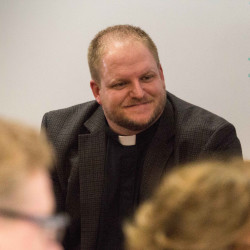 Canon Dan Alger, the Director of Always Forward and the ACNA Provincial Canon for Church Planting will be our plenary speaker for the 2017 “Mission Matters” Conference and Synod of the Anglican Diocese of the South. Canon Dan also serves as the ADOTS Canon for Church Planting.
Canon Dan Alger, the Director of Always Forward and the ACNA Provincial Canon for Church Planting will be our plenary speaker for the 2017 “Mission Matters” Conference and Synod of the Anglican Diocese of the South. Canon Dan also serves as the ADOTS Canon for Church Planting.
The Conference will be held November 3-4, 2017 at Holy Cross Cathedral in Loganville, Georgia. Registration opens in mid-August.
Canon Dan has helped us to embrace a vision of church planting as integral to our ministry and mission: “As the early Church began to live out the Great Commission, their methodology was to plant churches in every city where a door was opened. Through this work the Gospel was spread throughout the world. In our day we must focus on planting new churches as well if our focus is to be on the lost. Whereas established churches tend to grow primarily through transfer growth, new congregations most often see a larger portion of their growth come from conversions.So, to be most effective in bringing the unsaved to the knowledge and love of Christ, we must plant churches.”

Our conference begins on Friday with a clergy gathering and a lay leaders gathering in the afternoon. We hold our annual Eucharist of the Diocese that evening, followed by an optional dinner. On Saturday we begin with Morning Prayer, followed by our Meeting of the Synod Delegates. After that, we enjoy a plenary speaker, have lunch and fellowship together, and then participate in workshops before being sent out into the world to love and serve the Lord!
Q&A With Canon Dan
ADOTS: How does starting a new church help us reach new people?
DAN: The ease of entrance into new church plants provides a quick connection point for people who are new to an area to make friends and get involved. This makes church planting highly effective at reaching new families and peoples in a particular area. Because our nation is increasingly transient, this makes church planting all the more important.
ADOTS: How does church planting help existing churches?
DAN: Church planting not only creates new congregations, it revitalizes and motivates our existing churches. In the same way that grandchildren bring new energy to their grandparents, new baby churches bring renewed life to established churches.
Church plants bring faithful innovation in methodology, a passion for reaching the lost and evangelistic effectiveness and provide an example of risk-taking for the Gospel. These offerings make their way into the Diocese and surrounding churches and help create healthy and mission-focused churches.
ADOTS: What are the resources necessary for us to support long term church planting?
DAN: Church planting requires processes for educating, assessing, training, care, coaching and resourcing. It is a very difficult work that needs specialized preparation and ongoing support as well as intentional relationships. These support structures would greatly increase the efficiency, effectiveness, and success rate of our church plants and the health of our church planters.
Church planting is an endeavor of the people of the church, led by the work of the Holy Spirit. For God’s people to be most effective, creative and healthy we need to pursue this work within the context of deep relationships. This cannot be an effort driven strictly by corporate goals or jurisdictional systems, church planting must be born from a shared passion for the Gospel and pursued together in accountable and supportive community.
We must firmly believe that the future health and fruitfulness of the Diocese rests upon our willingness to pursue a radical dedication to church planting.
Canon Dan will speak on Saturday morning.

